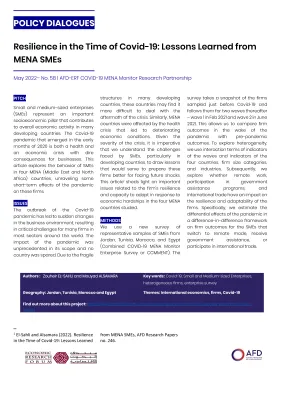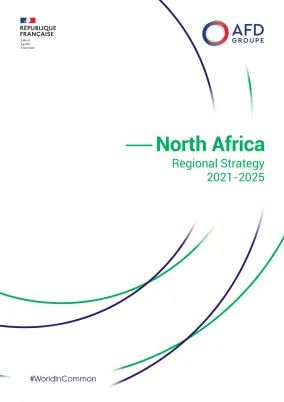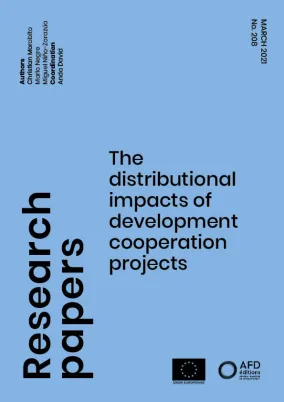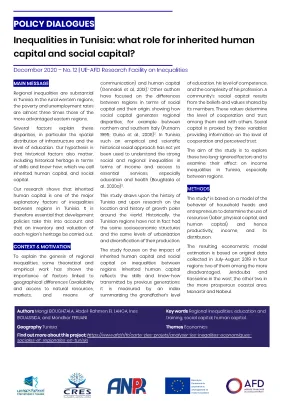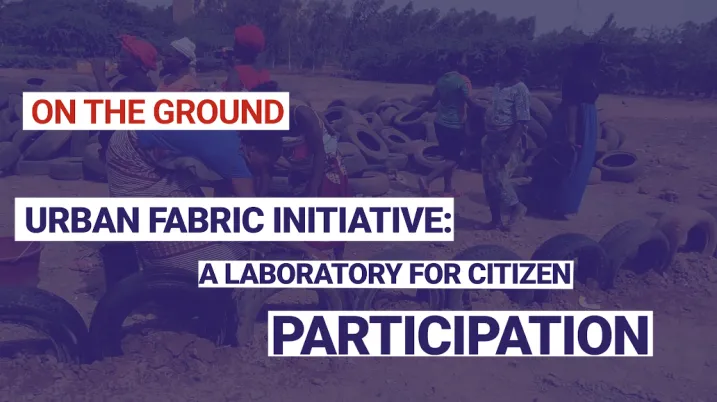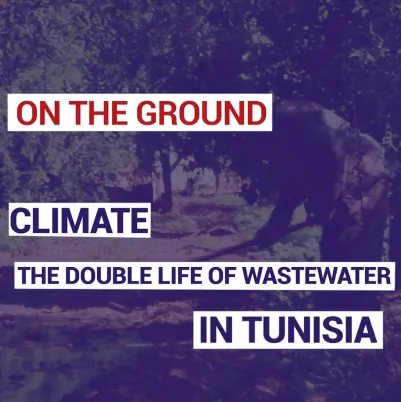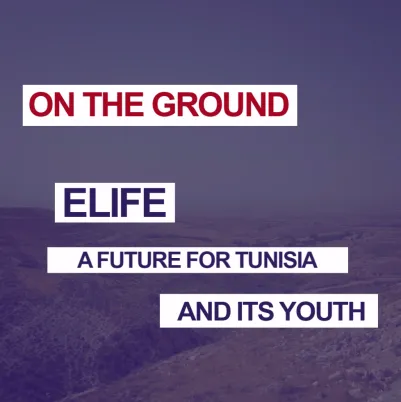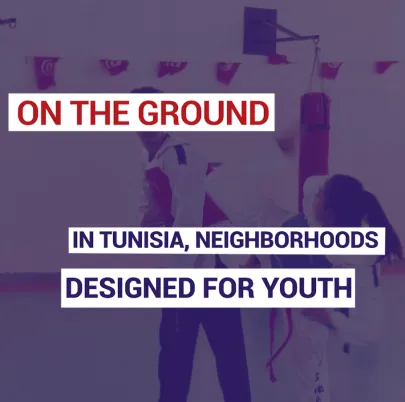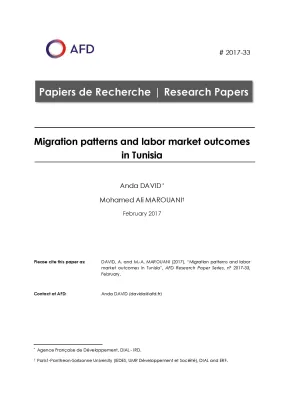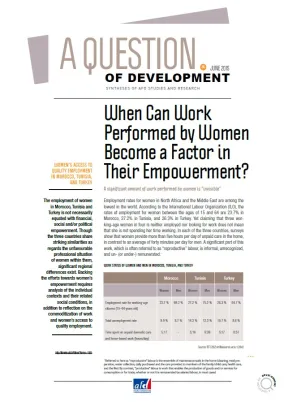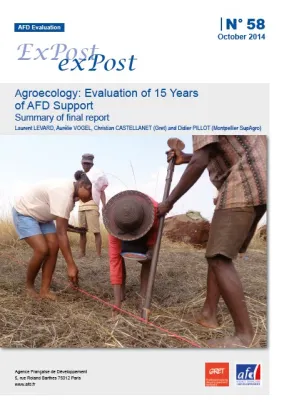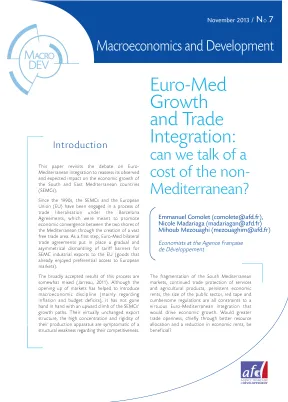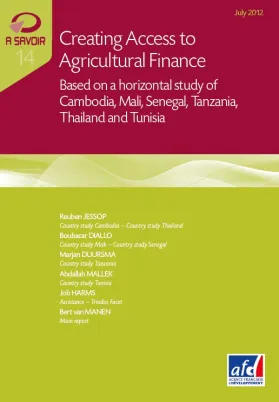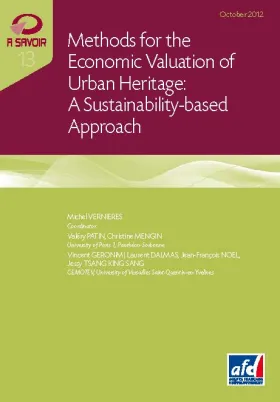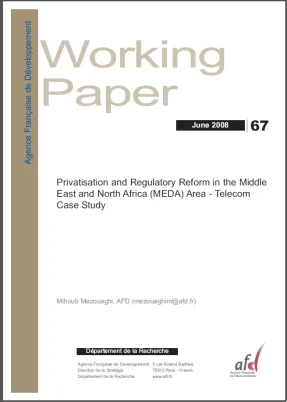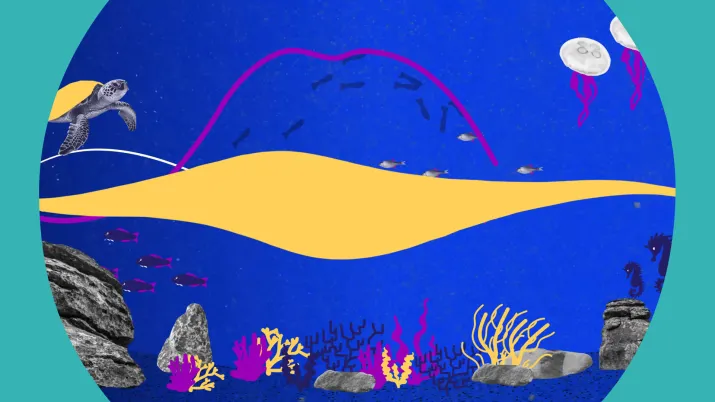Publications and media
Resilience in the Time of Covid-19: Lessons Learned from MENA SMEs
Small and medium-sized enterprises (SMEs) represent an important socioeconomic pillar that contributes to overall economic activity in many developing countries. The Covid-19 pandemic that emerged in...
Published on
AFD Group and Europe in North Africa
For more than ten years, in North Africa, the AFD Group has developed a very close partnership with the European Commission. This partnership begins with a constant dialogue and continues with an oper...
Published on
3 questions to Fawzia Baba-Aissa in charge of the development of the Women's Fund in the Mediterranean area
On the occasion of the Generation Equality Forum which opened on June 30, 2021 in Paris, discover the gender issues in North Africa and the Middle East with Fawzia Baba-Aissa, development officer at t...
Published on
North Africa - 2021-2025 Regional Strategy
Set up in September 2019, the North Africa Regional Office covers five countries: Morocco, Algeria, Tunisia, Libya and Egypt. This strategy aims to position AFD Group’s action as a support for buildin...
Published on
The distributional impacts of development cooperation projects
In 2015, world leaders committed, through the adoption of the 2030 Agenda for Sustainable Development, to reduce inequalities. Accordingly, a specific Sustainable Development Goals Goal (SDG 10) has b...
Published on
Inequalities in Tunisia: what role for inherited human capital and social capital?
Regional inequalities are substantial in Tunisia. In the rural western regions, the poverty and unemployment rates are almost three times those of the more advantaged eastern regions. Several factors...
Published on
Urban fabric initiative: a laboratory for citizen participation
The urban fabric initiative brings out and supports small or temporary micro-projects, carried by the inhabitants and quickly implemented, on the sites of urban projects financed in parallel by the Ag...
Published on
Climate: the double life of wastewater
In Tunisia, climate change is likely to exacerbate an already critical situation of water stress. While demand is growing, Water is becoming scarce. Following the Paris Climate Agreement, AFD has l...
Published on
Elife : a future for tunisia and its youth
The Elife program consists of building and running technology, entrepreneurship, training and cultural centers in ten cities in Tunisia. Far too many young people from the Higher Institute of Technolo...
Published on
In Tunisia, neighborhoods designed for youth
Thanks to an ambitious nationwide programme, AFD and the European Union are supporting the regeneration of many forgotten neighbourhoods in Tunisia. As well as providing basic services, the scheme cre...
Published on
Migration patterns and labor market outcomes in Tunisia
This article focuses on the external effects of emigration on non-migrants and particularly on the interactions with labor market outcomes in Tunisia before and after the revolution. Using the new Tun...
Published on
When Can Work Performed by Women Become a Factor in Their Empowerment? - Women‘s access to quality employment ...
The employment of women in Morocco, Tunisia and Türkiye is not necessarily equated with financial, social and/or political empowerment. Though the three countries share striking similarities as regard...
Published on
Agroecology: Evaluation of 15 Years of AFD Support
This document is a summary of the final report on the external evaluation of 15 years of support actions by Agence Française de Développement and the French Facility for Global Environment – FFGE in a...
Published on
Euro-Med Growth and Trade Integration: can we talk of a cost of the non-Mediterranean?
This paper revisits the debate on EuroMediterranean integration to reassess its observed and expected impact on the economic growth of the South and East Mediterranean countries (SEMCs).
Published on
Creating Access to Agricultural Finance - Based on a horizontal study of Cambodia, Mali, Senegal, Tanzania, Th...
Inadequate financing of the agricultural sector remains a major constraint in developing countries. Despite the existence of genuine financial needs of large magnitude, financial institutions face dif...
Published on
Methods for the Economic Valuation of Urban Heritage: A Sustainability-based Approach
Today, development actors see urban heritage as a resource for their territory, which is why they need to define its economic value. This evaluation is a delicate exercise as such patrimony is general...
Published on
Privatization and Regulatory Reform in the Middle East and North Africa Area
During the nineties, the globalization of telecommunications imposed a model of development based on the suppression of public monopolies, leading to international competition and the privatization of...
Published on
The AFD Group and the Mediterranean
In a regional context marked by increasing environmental pressures, the Mediterranean faces major challenges such as pollution, overfishing, and water stress. To protect this unique ecosystem, the AFD...

